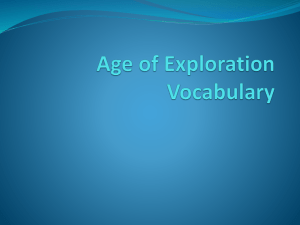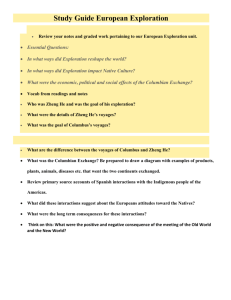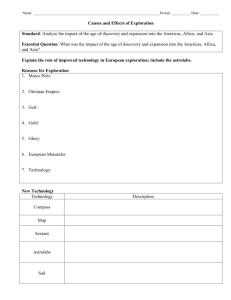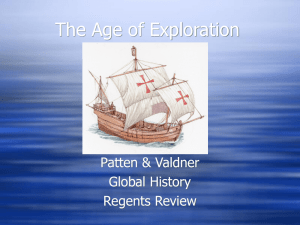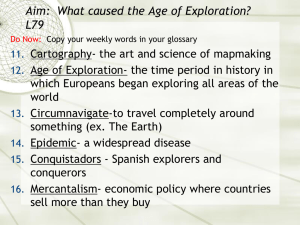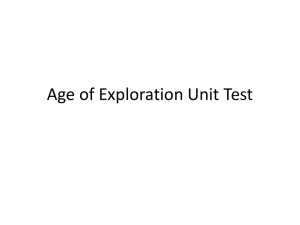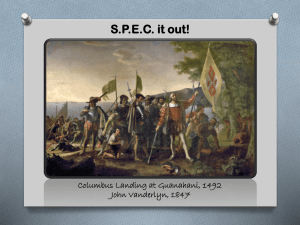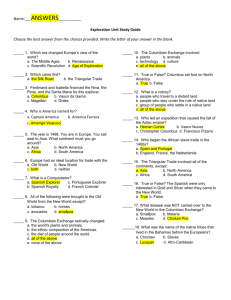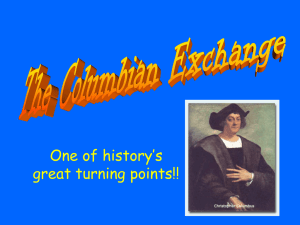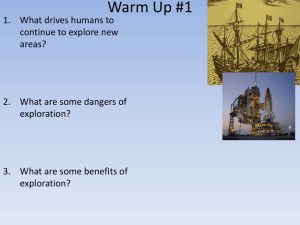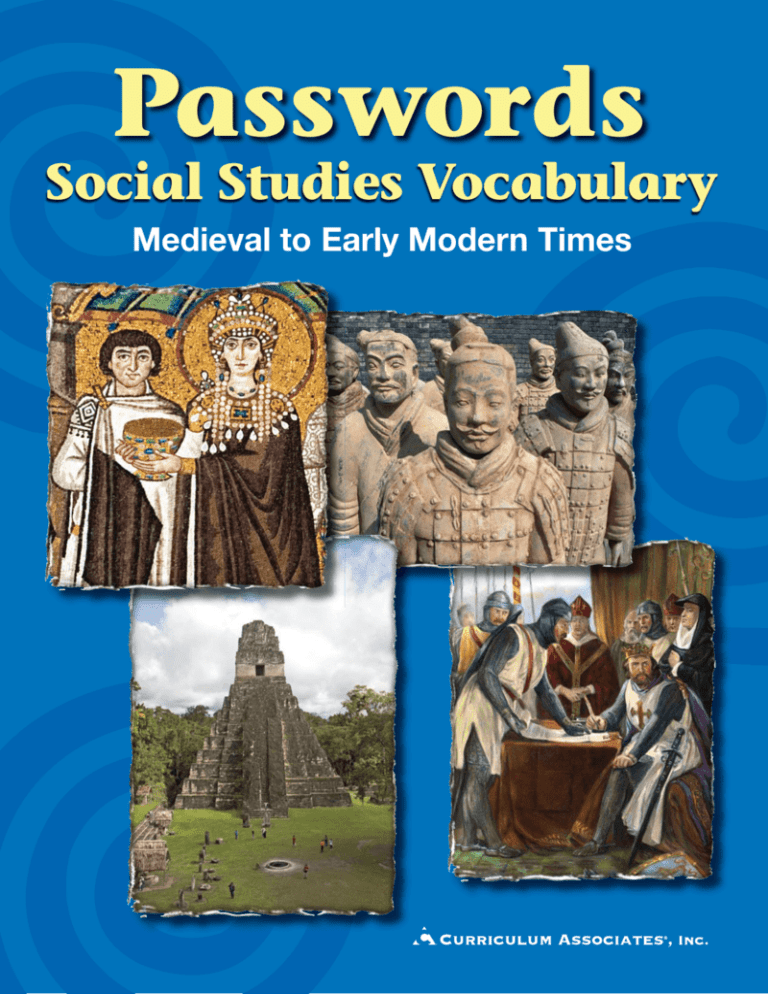
Passwords
Social Studies Vocabulary
Medieval to Early Modern Times
To the Student
What is chivalry? Where is Mesoamerica? How is a
theory different from a hypothesis? Passwords: Social
Studies Vocabulary will help you learn the words you need
to do well in social studies. The lessons in this book are about
social studies topics you will be studying.
Every lesson focuses on ten words that will help you
understand the topic. The lessons include a reading selection
that uses all ten vocabulary words. Four practice activities follow
the reading selection. Using each vocabulary word many times
will help you remember the word and its meaning. A writing
activity ends the lesson. You will use the vocabulary words you
have learned to write a journal entry, a letter, a narrative, or a
description.
If you need help with a vocabulary word as you do the
activities, use the Glossary at the back of the book. The Glossary
defines each word and shows you the correct way to pronounce
the word. It also has pictures to help you understand the
meaning of difficult words.
As you work on the lessons, you may learn other social
studies words besides the vocabulary words. Keep track of those
other words in My Social Studies Vocabulary on pages 94–98.
Turn to pages 99 and 100 to learn about roots, prefixes,
and suffixes. Find out how they can help you understand social
studies words.
ISBN 978-0-7609-4497-4
©2008—Curriculum Associates, Inc.
North Billerica, MA 01862
No part of this book may be reproduced by any means
without written permission from the publisher.
All Rights Reserved. Printed in USA.
15 14 13 12 11 10 9 8 7 6 5 4 3 2 1
Passwords: Social Studies Vocabulary - Medieval to Early Modern Times—www.curriculumassociates.com—800-225-0248
Table of Contents
Lesson 1:
The Fall of the Roman Empire . . . . . . . . . . . . . . . . . . 4
Lesson 2:
The Byzantine Empire . . . . . . . . . . . . . . . . . . . . . . 10
Lesson 3:
The Muslim Empire . . . . . . . . . . . . . . . . . . . . . . . 16
Lesson 4:
China in the Middle Ages . . . . . . . . . . . . . . . . . . . . 22
Lesson 5:
Empires of West Africa . . . . . . . . . . . . . . . . . . . . . . 28
Lesson 6:
Japan in the Middle Ages . . . . . . . . . . . . . . . . . . . . 34
Lesson 7:
Medieval Europe . . . . . . . . . . . . . . . . . . . . . . . . . . 40
Lesson 8:
The Role of the Church in Medieval Europe . . . . . . . . 46
Lesson 9:
Early Civilizations of the Americas . . . . . . . . . . . . . . 52
Lesson 10:
The Renaissance . . . . . . . . . . . . . . . . . . . . . . . . . . 58
Lesson 11:
Leading Figures and Achievements of
the Renaissance . . . . . . . . . . . . . . . . . . . . . . . . . . 64
Lesson 12:
The Reformation . . . . . . . . . . . . . . . . . . . . . . . . . 70
Lesson 13:
The Scientific Revolution . . . . . . . . . . . . . . . . . . . . 76
Lesson 14:
The Age of Exploration . . . . . . . . . . . . . . . . . . . . . 82
Lesson 15:
The Enlightenment . . . . . . . . . . . . . . . . . . . . . . . . 88
My Social Studies Vocabulary . . . . . . . . . . . . . . . . . . . . . . . . . . 94
Root Words . . . . . . . . . . . . . . . . . . . . . . . . . . . . . . . . . . . . . 99
Prefixes and Suffixes . . . . . . . . . . . . . . . . . . . . . . . . . . . . . . 100
Glossary . . . . . . . . . . . . . . . . . . . . . . . . . . . . . . . . . . . . . . 101
Passwords: Social Studies Vocabulary - Medieval to Early Modern Times—CURRICULUM ASSOCIATES®, Inc.—www.curriculumassociates.com—800-225-0248
LESSON
14
navigator
cartographer
astrolabe
Columbian Exchange
commerce
sponsor
caravel
latitude
colony
capitalism
If you could travel anywhere in the world, where would you go? How
would you get there? How might tools of modern technology be helpful to
you? Read this selection to find out about some of the great voyages that
took place during the Age of Exploration.
The Age of Exploration
Great Voyages of Discovery
In the 1400s, Europeans wanted spices, silks, and other goods
from Asia. This spurred them to look for sea routes to Asia. Portugal
led the way. Portuguese ships sailed east. They went around Africa
all the way to India. They set up many trading posts.
The Italian navigator
Christopher Columbus
Columbus’s First Voyage to the Americas
had a different idea.
EUROPE
He would sail west. A
navigator directs the
route of a ship. The king
and queen of Spain
became his sponsors. A
sponsor is a person who
SPAIN
NORTH
AMERICA
Aug. 3, 1492
Columbus sets
sail.
Oct. 12, 1492
Columbus lands.
Atlantic
Ocean
AFRICA
Caribbean Sea
SOUTH
AMERICA
gives money to support a
project. In 1492, Columbus’ ships crossed the Atlantic Ocean. They
landed, not in Asia, but on islands in the Caribbean Sea. Columbus
claimed them for Spain. Then he sailed back with gold and pearls.
He did not know he had discovered the Americas.
In 1519, Ferdinand Magellan of Portugal made another great
voyage. He was the first to sail completely around the world.
82
The Age of Exploration
Passwords: Social Studies Vocabulary - Medieval to Early Modern Times—CURRICULUM ASSOCIATES®, Inc.—www.curriculumassociates.com—800-225-0248
New Technology
The Portuguese were the best cartographers
at the time. A cartographer is a mapmaker.
Their maps and other new tools helped to
advance exploration. A Portuguese ship called
The Columbian Exchange
From the Americas to Europe,
Africa, and Asia
Cacao
Squash
Beans
Beans
Peanuts
Tomatoes
Tobacco
Potatoes
Corn
a caravel had special sails. They were helpful
on long voyages. The compass helped sailors
Atlantic Ocean
keep track of direction. Sailors also used an
instrument called an astrolabe. It found
their ship’s latitude. Latitude is a distance
north or south of the equator.
From Europe, Africa, and Asia
Grain
to the Americas
Bananas
Grapes
Sugar Cane
Honeybees
Disease
Citrus Fruits
Grain
Coffee Beans
Livestock
Olives
As worldwide trade increased, European
countries set up colonies. A colony is a place
controlled by another country. The natural
resources of these colonies provided wealth to
European countries.
Changes in Europe’s Economy
During this period, commerce expanded.
Commerce is the buying and selling of goods
in large amounts over long distances. Capitalism
This early astrolabe
helped sailors to figure
out their ship’s latitude.
also began to emerge. Capitalism is an
economic system in which private owners control
and use resources for profit.
Effects of Exploration
New trade routes led to a worldwide
exchange of goods and ideas. The Columbian
Exchange was the movement of people, plants,
animals, and diseases between the Eastern and
Western hemispheres. This exchange began
after Columbus sailed to the Americas.
My Social Studies Vocabulary
Go to page 98 to list other words you have learned
about the Age of Exploration.
The Age of Exploration
83
Passwords: Social Studies Vocabulary - Medieval to Early Modern Times—CURRICULUM ASSOCIATES®, Inc.—www.curriculumassociates.com—800-225-0248
navigator
cartographer
astrolabe
Columbian Exchange
commerce
sponsor
caravel
latitude
colony
capitalism
A.
Circle the word that best answers each question.
1.
I am an instrument once used to find a ship’s latitude. What am I?
caravel
2.
navigator
I am a person who gives money to support a project. Who am I?
cartographer
3.
astrolabe
navigator
sponsor
I am an economic system in which private owners control and use resources
for profit. What am I?
capitalism
4.
caravel
capitalism
colony
sponsor
navigator
I am a ship with special sails designed for long voyages. What am I?
caravel
9.
Columbian Exchange
I am a person who directs the route of a ship. Who am I?
cartographer
8.
astrolabe
I am a place that is controlled by another country. What am I?
sponsor
7.
cartographer
I am the distance north or south of the equator. What am I?
latitude
6.
Columbian Exchange
I am a mapmaker. Who am I?
navigator
5.
commerce
astrolabe
latitude
I am the buying and selling of goods in large amounts over long distances.
What am I?
capitalism
10.
commerce
colony
I am the movement of people, plants, animals, and diseases between the
Eastern and Western hemispheres. What am I?
commerce
84
capitalism
Columbian Exchange
The Age of Exploration
Passwords: Social Studies Vocabulary - Medieval to Early Modern Times—CURRICULUM ASSOCIATES®, Inc.—www.curriculumassociates.com—800-225-0248
navigator
cartographer
astrolabe
Columbian Exchange
commerce
sponsor
caravel
latitude
colony
capitalism
B.
Circle the word that makes sense in each sentence. Then write the word.
1. Spain set up a (caravel, colony) in the Americas, where Columbus had landed.
2. After finding out their ship’s (latitude, astrolabe), sailors knew how far north or
south of the equator they were.
3. As (navigator, sponsor), Columbus directed the ship to sail west.
4. Unfortunately, disease was one of the things that moved between hemispheres in the
(commerce, Columbian Exchange).
5. Overseas trade and wealth from colonies led to the growth of a new economic
system called (capitalism, colony).
6. Maps made by a (navigator, cartographer) were helpful tools in exploration.
7. The buying and selling of goods in large amounts over long distances is called
(commerce, capitalism).
8. The (cartographer, sponsor) of the trip hoped to make money.
9. The special sails of the (latitude, caravel) were designed for long voyages.
10. Sailors used an instrument called the (caravel, astrolabe) to find their ship’s
W
latitude.
RD ROOT
O
The word astrolabe comes from the Greek
word astron, which means “star.”
The Age of Exploration
85
Passwords: Social Studies Vocabulary - Medieval to Early Modern Times—CURRICULUM ASSOCIATES®, Inc.—www.curriculumassociates.com—800-225-0248
navigator
cartographer
astrolabe
Columbian Exchange
commerce
sponsor
caravel
latitude
colony
capitalism
C.
Choose the correct vocabulary word to complete each sentence.
1. The map made by the
showed the west coast
of Africa.
2. Under the economic system of
, private owners
control and use resources for profit.
3. Christopher Columbus was the
for three ships that
sailed across the Atlantic Ocean.
4. New foods came to Europe as part of the
.
5. The buying and selling of goods in large amounts over long distances is called
.
6. Columbus could afford to sail three ships across the Atlantic Ocean because he
had a
for the voyage.
7. Sailors used the ship’s
to find their distance from
the equator.
8. The sailors wished they had a
9. The natural resources of a
for the long voyage.
provided wealth to the
country that controlled it.
10. A distance north or south of the equator is called
86
.
The Age of Exploration
Passwords: Social Studies Vocabulary - Medieval to Early Modern Times—CURRICULUM ASSOCIATES®, Inc.—www.curriculumassociates.com—800-225-0248
navigator
cartographer
astrolabe
Columbian Exchange
commerce
sponsor
caravel
latitude
colony
capitalism
D.
Use each word in a sentence that shows you understand the meaning of the word.
1. caravel
2. commerce
3. Columbian Exchange
4. navigator
5. latitude
6. capitalism
7. sponsor
8. astrolabe
9. cartographer
10. colony
Write!
Write your response to the prompt on a separate sheet of paper.
Use as many vocabulary words as you can in your writing.
Imagine you are a sailor living during the 1400s, when the new era of exploration
began. Write a journal entry describing one of your voyages overseas.
The Age of Exploration
87
Passwords: Social Studies Vocabulary - Medieval to Early Modern Times—CURRICULUM ASSOCIATES®, Inc.—www.curriculumassociates.com—800-225-0248

